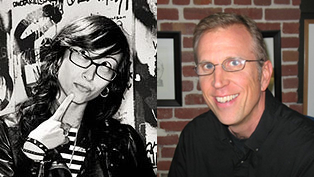In a letter to readers, East Bay Express president Jay Youngdahl says "our publication is currently healthier than it has been for more than a decade."
Palo Alto Weekly editor Jay Thorwaldson will retire at the end of January. Managing editor Jocelyn Dong has been named his successor.
The East Bay Express announced the departure of longtime editor Stephen Buel. Managing editor Kathleen Richards and staff writer Robert Gammon will take over as co-editors.
That's Robert Newman's take, as he continues to highlight the excellent work being done by alt-weekly art directors around the country. Jay Vollmar, who has been Westword's art director for 10 years, comes from a background doing rock posters, and he tells Newman his approach to the two are very similar. "I usually apply the same principles to Westword covers as I do to poster projects," Vollmar says. "It starts with trying to boil a story down to its basics and then illustrate that in a simple image that can grab you from across the street. I just try to basically capture the vibe of a story much like I do with a band, the specific lyrics, words or details aren't as important or workable as the overall theme."
Jay Levin, who started the Weekly in 1978, says that RealTALK LA magazine, a monthly free glossy to debut in May, will "re-invent the concept of a city magazine." Its sister publication, Realtalkla.com, "is intended to create a new Los Angeles online community," and will be live in late April. Karen Fund, former chair and associate publisher of the Weekly, joins Levin's team as publisher and executive vice president of RealTALK Media Group, the publications' parent company.
After getting fired from Larry Flynt's L.A. Free Press, Jay Levin founded L.A. Weekly and put out the first issue on Dec. 7, 1978. Seed money came from several investors, including actor-producer Michael Douglas. In an interview with Kristine McKenna for the paper's 25th anniversary edition, Levin recalls the grueling early days when the L.A. Weekly was undercapitalized and then grew rapidly. The paper, now owned by Village Voice Media, had a strong emphasis on international as well as local news and was more progressive than it is today, Levin says. But rumors that the office was a hotbed of drug abuse and interoffice sex are wildly exaggerated.



